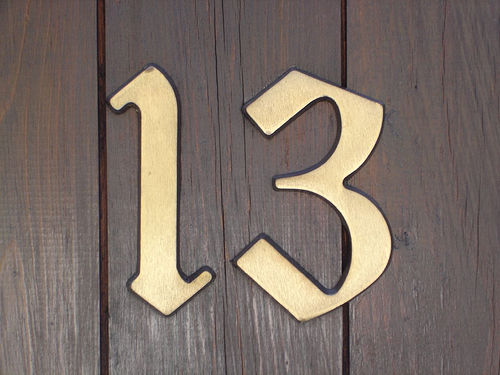The number 13 has a long history of being unlucky. As a result, most hotels don’t have 13 floors, most planes don’t have a 13th row, and airports rarely boast a Gate 13. There are a few theories about the ominous nature of this number.
Judas, the betrayer of Jesus, was the 13th member present at the Last Supper and is commonly cited as the main reason 13 is to be avoided. In ancient Rome a witch’s coven comprised 12, with the 13th being the devil. There is also a Norse myth about 12 gods dining who are joined by a 13th uninvited guest, Loki, who proceeds to persuade the God of Darkness to slay the God of Happiness. Numerologists consider the number 12 to be a ‘complete number’ because it is the number of months in a year, the number of Olympian gods, the number of apostles etc and so 13 can simply be thought of as avoidable because it exceeds a complete number by one.
In contrast, the Chinese and the Egyptians consider the number 13 lucky. Sikhs believe 13 is a special number based on a legend about Guru Nanak Dev and also because 13 is tera in Punjabi which means ‘yours’ as in ‘I am yours, O Lord’. Ancient Egyptians associated the number 13 with eternal afterlife. For them, 13 symbolized death: But a glorious and desirable death. It’s possible that this association with death carried on but the positive nature of it did not.
Judas, the betrayer of Jesus, was the 13th member present at the Last Supper and is commonly cited as the main reason 13 is to be avoided. In ancient Rome a witch’s coven comprised 12, with the 13th being the devil. There is also a Norse myth about 12 gods dining who are joined by a 13th uninvited guest, Loki, who proceeds to persuade the God of Darkness to slay the God of Happiness. Numerologists consider the number 12 to be a ‘complete number’ because it is the number of months in a year, the number of Olympian gods, the number of apostles etc and so 13 can simply be thought of as avoidable because it exceeds a complete number by one.
In contrast, the Chinese and the Egyptians consider the number 13 lucky. Sikhs believe 13 is a special number based on a legend about Guru Nanak Dev and also because 13 is tera in Punjabi which means ‘yours’ as in ‘I am yours, O Lord’. Ancient Egyptians associated the number 13 with eternal afterlife. For them, 13 symbolized death: But a glorious and desirable death. It’s possible that this association with death carried on but the positive nature of it did not.

